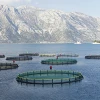39 careers found.
Actuaries evaluate risk and opportunity applying mathematical, statistical, economic and financial analyses to a wide range of business problems.
Agricultural scientists study commercial plants, animals and cultivation techniques to improve the productivity and sustainability of farms and agricultural industries.
Agricultural technical officers provide complex technical support and advise on aspects of agriculture such as research, production, servicing and marketing.
Aquaculture technicians are involved in freshwater and marine farming and hatchery management, as well as research into farmed species. They can be involved in equipment design, site development and research, and the harvesting, processing and shipment of products.
Astronomers study planets, stars, galaxies and other objects in the observable universe and use this information for theoretical and practical purposes.
Biochemists study the chemistry of living systems to increase scientific knowledge and develop ways to apply this knowledge in areas such as medicine, veterinary science, agriculture, environmental science and manufacturing. Biochemistry provides a basis for all the life sciences.
Biotechnologists study plants, animals and microorganisms. They use this knowledge to develop uses for biological processes, which include creating products for pharmaceutical, agricultural, diagnostic and environmental use, and advancing industrial processes. Their work may incorporate the use of small molecule technologies, nanotechnology, bioinformatics and synthetic biology.
Botanists study the biology of all types of plants to increase scientific knowledge and apply this knowledge in areas such as conservation and management of natural resources, agriculture, forestry, horticulture, medicine and biotechnology.
Chemists study the physical and chemical properties of materials to determine their composition. They use this information to develop new materials and products, to devise more efficient processes for making materials and to increase scientific knowledge. Chemists should not be confused with pharmacists (see separate entry for Pharmacist).
Environmental scientists measure and record features of the environment and study, assess and develop methods of controlling or minimising the harmful effects of human activity on the environment.
Geographic information systems officers design, develop and customise geographic information systems and provide technical and analytical support to address issues such as environmental management, exploration and mining, land ownership and titles, urban and regional planning, utilities and asset management, and demographic marketing.
Geological engineers identify and try to solve problems involving soil, rock and groundwater, and design structures in and below the ground, using the principles of earth science. Geological engineering includes a number of ground engineering specialities such as geotechnical engineering, land remediation, rock mechanics, groundwater hydrology and engineering geology.
Geologists study the nature, composition and structure of the earth to locate materials and minerals, and to increase scientific knowledge. They also advise on the extraction of minerals, as well as on environmental protection, the rehabilitation of land after mining and on civil engineering projects.
Geophysicists study the structure and composition of zones below the surface of the earth by taking measurements using seismic, gravity, magnetic and electrical data collection methods. The two main divisions of geophysics are exploration geophysics, which deals with the search for Earth's resources, and global geophysics, which uses the same techniques to study Earth as a whole and study earthquakes, magnetic fields and other phenomena. Geophysicists often specialise in areas such as seismology and seismic interpretation, borehole geophysics, mineral exploration, engineering geophysics, environmental or groundwater geophysics, or computer processing and software development.
Intelligence analysts evaluate information from a variety of classified and unclassified sources. This information is often incomplete, contradictory and can vary widely in terms of reliability. Depending on their background and qualifications, an intelligence analyst may examine a diverse set of countries, issues (such as terrorism) and cultures. Intelligence analysts working for the Department of Defence specialise in a number of areas depending on their training, qualifications and agency employment.









